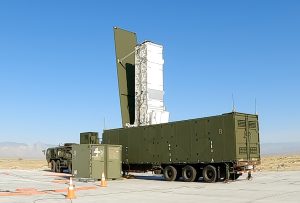The Philippines has defended its decision to acquire a U.S. intermediate-range missile system if it feels the need to do so, after the Chinese government accused it of provoking a regional “arms race” by considering the powerful weapons system.
Just before Christmas, the Philippine Army announced that it was in negotiations to acquire the Typhon missile system, one of which was deployed by U.S. forces in the northern Philippines since April, in order to strengthen the country’s external defenses.
Responding to the Philippine army’s announcement on Thursday, a spokesperson for China’s Foreign Ministry urged Manila to return to the path of “peaceful development.”
“By cooperating with the United States in the introduction of Typhon, the Philippine side has surrendered its own security and national defense to others and introduced the risk of geopolitical confrontation and an arms race in the region, posing a substantial threat to regional peace and security,” said spokesperson Mao Ning, according to Reuters.
On Saturday, Philippine National Security Adviser Eduardo Año said that the deployment of the Typhon missile system was an effort to enhance the country’s defense and not meant to ”undermine the security of any nation.”
“As a sovereign nation, the Philippines has the right to determine the most appropriate measures to safeguard its security and the well-being of its people,” Año said in a statement, as per the Philippine Star. “Just like any other nation, the procurement of defense systems, including the Typhon missile launcher, is a step toward strengthening our deterrence capabilities and ensuring that we are prepared to defend our territory when required.”
While Philippine officials have emphasized that the missile system would defend “floating assets” within the country’s 200-nautical-mile exclusive economic zone, the Typhon missile system can fire Tomahawk Land Attack Missiles, which have a range of 1,600 kilometers, capable of striking targets in mainland China.
The U.S. military deployed the Typhon missile system to the northern Philippines in April, ahead of the Balikatan military exercises, and then left it in place after the conclusion of the exercises in May. Since then, China’s government has repeatedly urged the Philippines to withdraw the system, describing it variously as “an extremely irresponsible choice” that “undermines regional peace and stability,”
The U.S. Army’s deployment of the missile system came amid growing tensions over parts of the hotly contested South China Sea, which have seen Philippine and Chinese coast guards clash over a number of disputed features in the Spratly Islands.
These tensions have been both a cause and effect of President Ferdinand Marcos Jr.’s steady fortification of security cooperation with the U.S., the country’s long-standing security ally. Since mid-2022, the Marcos administration has initiated joint maritime patrols with the U.S. and other partners, and expanded the U.S. military’s access to Philippine military facilities under the 2014 Enhanced Defense Cooperation Agreement.
In this respect, Chinese officials are right that the Philippines’ decision to acquire the missile system, provided it can afford to do so, would contribute to the deepening of the security dilemma that has bedeviled relations between the two nations over the past two-and-a-half years. However, it is also undeniable that China has contributed significantly to the hardening of attitudes in Manila. If Chinese officials were truly interested in better relations with Manila, they would take steps of their own to stabilize the situation in the South China Sea.

































